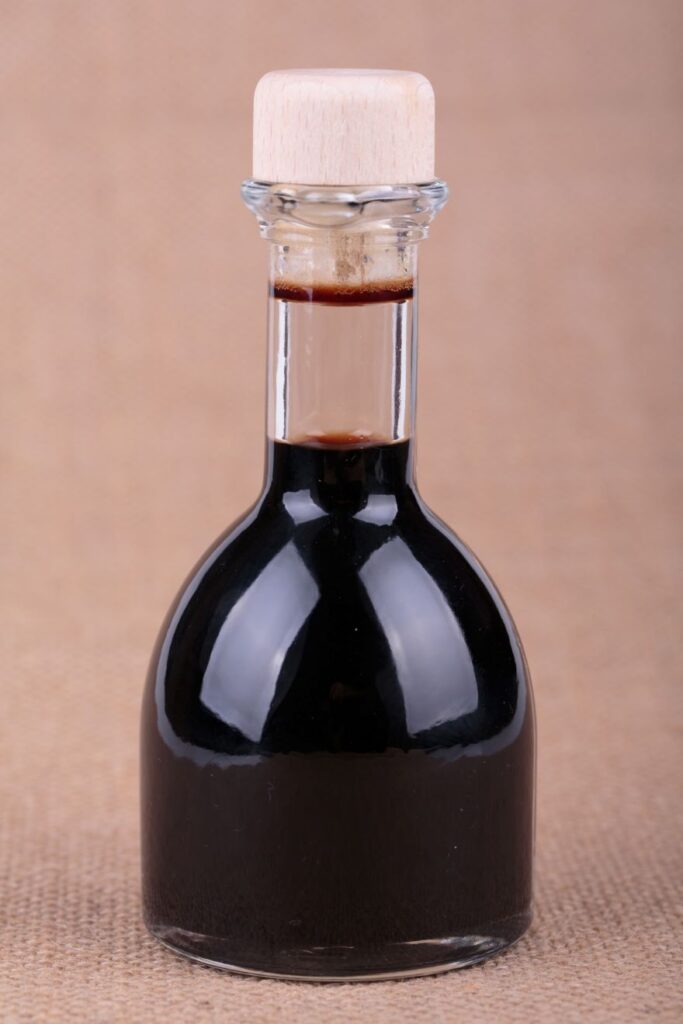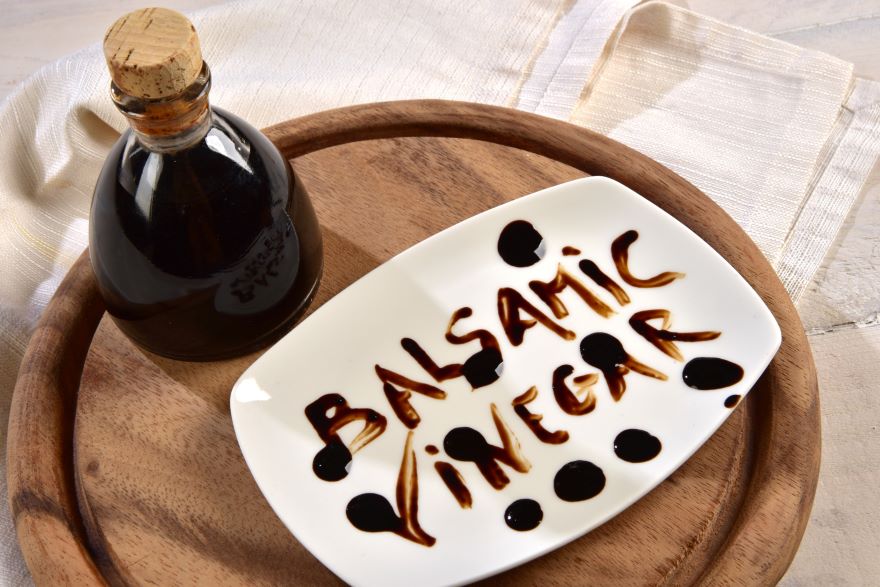Balsamic vinegar is a popular and versatile condiment, known for its unique flavor profile that balances sweet and tangy tastes. This vinegar originates from Modena, Italy, and is made from fermenting grape juice. It adds a special touch to salads, marinades, and even desserts. As people become more health-conscious, it’s essential to understand the caloric content of balsamic vinegar to make informed choices about incorporating it into a balanced diet.
While balsamic vinegar is low in calories, its complex flavor can elevate a simple dish into a gourmet experience. With only 14 calories per tablespoon, balsamic vinegar is a wise choice for those looking to add some zest to their meals without piling on unnecessary calories. In addition to its calorie count, balsamic vinegar also offers a range of health benefits and nutrients, making it a wholesome choice for those seeking to prioritize their well-being.
Key Takeaways
- Balsamic vinegar is a low-calorie condiment with a unique sweet and tangy flavor
- It contains 14 calories per tablespoon, making it a healthy addition to various dishes
- This versatile ingredient offers multiple health benefits and nutrients, enhancing both your meals and well-being.
Basics of Balsamic Vinegar
Balsamic vinegar is a popular ingredient and condiment originating from Italy.Balsamic vinegar’s rich taste and acidic kick make it widely used across various cuisines to enhance the flavor of various foods. It appears in salad dressings, marinades, and glazes.
Balsamic vinegar gets its deep brown color and distinctive, bold, complex flavors from unfermented grape juice. It is known for its tart aftertaste, which is characteristic of this type of vinegar. When it comes to quality, there are varying levels – authentic, traditional balsamic vinegar tends to be pricier and boasts a richer flavor compared to more affordable commercial varieties.
People often seek balsamic vinegar for its potential health benefits in addition to its culinary uses. Balsamic vinegar is believed to offer antioxidant properties that can be beneficial for overall health and aid in digestion when consumed moderately. Moreover, it can be a low-calorie condiment when compared to other alternatives, making it an appealing option for those watching their calorie intake.
When incorporating balsamic vinegar into our dishes, it’s essential to consider the right ratios and balance when combining it with other ingredients, as too much vinegar can overpower the flavor of the dish. Whether used as a finishing drizzle for grilled vegetables, a flavorful addition to salad dressings, or as a tangy marinade for meats, this versatile vinegar brings a unique depth of flavor to a wide range of culinary applications.
Nutritional Breakdown
Balsamic vinegar is a flavorful and versatile ingredient commonly used in various dishes, from salads to sauces. Its popularity comes not only from its unique taste but also from its nutritional benefits. In this section, we will discuss the nutritional breakdown of balsamic vinegar.
One of the primary aspects that make balsamic vinegar a healthy option is its low-calorie content. A typical serving size of balsamic vinegar is 1 tablespoon, which contains only 14 calories. This makes it an ideal choice for those looking to add flavor to their food without consuming a significant amount of calories.
Balsamic vinegar mainly consists of carbohydrates, specifically 43.4g per 100g, with negligible amounts of fat and protein in terms of macronutrients. The carbohydrates in balsamic vinegar come in the form of sugar (2.4g) and dietary fiber (found in trace amounts).
Our bodies need various minerals in order to function properly, and balsamic vinegar contributes quite a few to our diet including:
- Potassium: 285.6mg per 100g
- Calcium: 4.32mg per 100g
- Iron: 0.12mg per 100g
These minerals are essential for maintaining electrolyte balance, bone health, and blood oxygenation, respectively (source).
Moreover, balsamic vinegar has a relatively low sodium content with only 58.7mg per 100g, making it a healthier alternative to other condiments that are often high in sodium, such as soy sauce or salt.
In conclusion, we have covered the nutritional breakdown of balsamic vinegar, emphasizing its low-calorie content, carbohydrate composition, and the presence of essential minerals.You can incorporate balsamic vinegar, a versatile and healthy ingredient, into a wide range of dishes. Keep in mind, though, that moderation is always key when it comes to maintaining a balanced diet.
Vitamins and Minerals Content
Balsamic vinegar is not only popular for its unique taste but also its nutritional value. In this section, we will discuss the various vitamins and minerals present in balsamic vinegar, which contribute to its health benefits.
First, let’s talk about the essential minerals found in balsamic vinegar. It contains calcium, which supports strong bones and teeth. As for potassium, it aids in regulating blood pressure and muscle contractions. You can consider balsamic vinegar as a healthier alternative to high-sodium condiments despite its comparatively low sodium content. It also provides a small amount of iron for blood health, along with phosphorus and magnesium for maintaining strong bones and proper cellular function.
Moreover, balsamic vinegar contains trace amounts of other minerals crucial for our health, such as zinc, copper, manganese, and selenium. These minerals work together to support immune function, antioxidant activity, and the proper functioning of various enzymes in the body.
Moving on to vitamins, while balsamic vinegar is not particularly rich in most vitamins, it does offer some benefits. For instance, it contains traces of vitamin A, which is essential for maintaining healthy vision, skin, and immune function. On the other hand, vitamin C is generally low in balsamic vinegar but is still present to some extent, contributing to a stronger immune system and aiding in collagen production.
In conclusion, balsamic vinegar contains a variety of essential minerals and trace amounts of vitamins that can contribute to overall health when consumed as part of a balanced diet. Keep in mind, though, that its nutritional content can vary depending on the quality and aging process of the vinegar. So, always opt for high-quality balsamic vinegar to ensure the greatest health benefits in your culinary creations.
Beneficial Compounds in Balsamic Vinegar
Balsamic vinegar is not only a flavorful addition to various dishes but also a source of numerous beneficial compounds. One of the primary components of balsamic vinegar is acetic acid, which comprises around six percent of its content. This slightly higher concentration compared to other vinegar types, such as distilled and apple cider vinegar, contributes to some of its unique properties.
Thanks to its antimicrobial compounds, balsamic vinegar can effectively combat bacteria and other harmful microorganisms. These compounds, together with acetic acid, work synergistically to promote a healthier environment both on our skin and in our digestive system. In fact, balsamic vinegar has been known to help improve skin health by maintaining a clear and radiant complexion.
Another vital component of balsamic vinegar is its rich antioxidant content, primarily in the form of polyphenols. Antioxidants play a crucial role in our overall health, as they protect our cells from damage caused by free radicals. This, in turn, helps in warding off various ailments associated with oxidative stress, such as heart disease and certain types of cancer.
In summary, balsamic vinegar is low in calories and packed with beneficial compounds like acetic acid, antimicrobial substances, and antioxidants. Balsamic vinegar’s compounds promote overall health, making it a versatile and nutritional addition to various dishes.

Balsamic Vinegar in Cooking
When it comes to enhancing the flavor of a dish, we often turn to balsamic vinegar. This versatile ingredient adds a tangy and rich taste to various dishes, making it a staple in many kitchens.
Use balsamic vinegar as a glaze for chicken to elevate the dish with a deep and delightful flavor. Create the perfect chicken glaze by combining balsamic vinegar with olive oil, honey, and herbs, marinating before cooking. The result is a succulent and flavorful dish that leaves everyone wanting more.
In addition to chicken, balsamic vinegar also works wonders with vegetables like broccoli. Toss broccoli in balsamic vinegar, olive oil, salt, and pepper before roasting for a delightful, slightly caramelized side dish. The vinegar helps to break down the natural bitterness of the vegetable, resulting in a tender and enjoyable dish.
Another great use for balsamic vinegar is in making a reduction or a glaze to enhance other dishes. Simmer balsamic vinegar slowly over low heat to create a thicker, flavorful sauce to drizzle over salads and roasted vegetables. This intense flavor pairs well with many ingredients, making it an invaluable addition to our culinary arsenal.
Be aware of potential risks associated with balsamic vinegar, despite its ability to elevate the taste of many dishes.. High-quality balsamic vinegar is made from grape must with natural sugars, but cheaper variants may contain additives. Overuse of sugar-laden balsamic vinegar can contribute to an increase in calorie intake and potential health issues. We recommend purchasing balsamic vinegar from reputable grocery or health food stores to ensure a quality product without unnecessary additives.
In conclusion, balsamic vinegar is a versatile ingredient with robust flavor and works well as a glaze. By using it mindfully and purchasing high-quality versions, we are able to elevate our culinary creations without compromising on health.
Comparison to Other Dressings
Compare balsamic vinegar to other dressings, considering nutritional differences in calories and fat content. Let’s explore how balsamic vinegar stacks up against dressings like olive oil, mayonnaise, and various creamy dressings.
Balsamic vinegar contains roughly 14 to 20 calories per tablespoon. Its tart flavor adds a delightful touch to salads without loading on excessive calories. Combine balsamic vinegar with healthier oils like olive, grapeseed, or avocado for a low-calorie dressing.
Olive oil, while considered a healthy fat, packs a higher calorie count compared to balsamic vinegar. Just 2 tablespoons contain 144 calories and 16 grams of fat. Swap olive oil dressing for balsamic vinegar or a more calorie-conscious oil if watching your waistline.
Mayonnaise-based dressings, such as ranch or Caesar, tend to be higher in calories and fat compared to their vinaigrette counterparts. These creamy dressings contain more saturated fat and, occasionally, trans fat, both considered unhealthy fats. Some options use Greek yogurt instead of mayonnaise or heavy cream, reducing calories and fat.
In summary, dressing choices significantly impact the overall nutritional value of a salad. Balsamic vinegar fares better than most dressings, with its lower calorie count and negligible fat content. Choose balsamic vinegar or combine with healthier oils for delicious and wholesome salad dressings that align with dietary goals.
Frequently Asked Questions
- How many calories are in 1 tablespoon of balsamic vinegar? In a single tablespoon of balsamic vinegar, there are approximately 14 calories. The calorie count is relatively low, making it a suitable addition to various recipes and dressings.
- What is the calorie count per ounce of balsamic vinegar? Per ounce (28 grams) of balsamic vinegar, there are roughly 56 calories. As balsamic vinegar is typically consumed in small quantities, it generally does not contribute significantly to one’s daily calorie intake.
- Can balsamic vinegar be used for weight loss? Balsamic vinegar is considered a low-calorie and low-fat option for adding flavor to meals, which can be beneficial when trying to lose weight. It’s a versatile ingredient that can make dishes more enjoyable without adding significant amounts of calories or fat.
- Is balsamic vinegar considered healthy? Yes, balsamic vinegar is considered healthy due to its low calorie and fat content as well as its potential benefits for managing diabetes. Moderate consumption of balsamic vinegar is associated with limited spikes in blood glucose levels. However, it is essential to use balsamic vinegar in moderation, as it might have a high sugar content.
- Does balsamic vinegar contain a high amount of sugar? Balsamic vinegar does contain sugar, with its exact amount varying depending on the type and quality of the vinegar. Generally, the sugar content in balsamic vinegar ranges from about 4 to 20 grams per tablespoon.Check the label for lower sugar content when choosing balsamic vinegar to watch sugar intake.
- Is balsamic vinegar suitable for consumption while dieting? Balsamic vinegar can be a suitable choice when following a diet due to its low-calorie and low-fat content. It offers a flavorful addition to salads, dressings, and marinades without significantly contributing to your daily calorie or fat intake. Be mindful of sugar content and consume balsamic vinegar in moderation for a balanced diet.

*We may earn a commission for purchases made using our links. Please see our disclosure to learn more.



